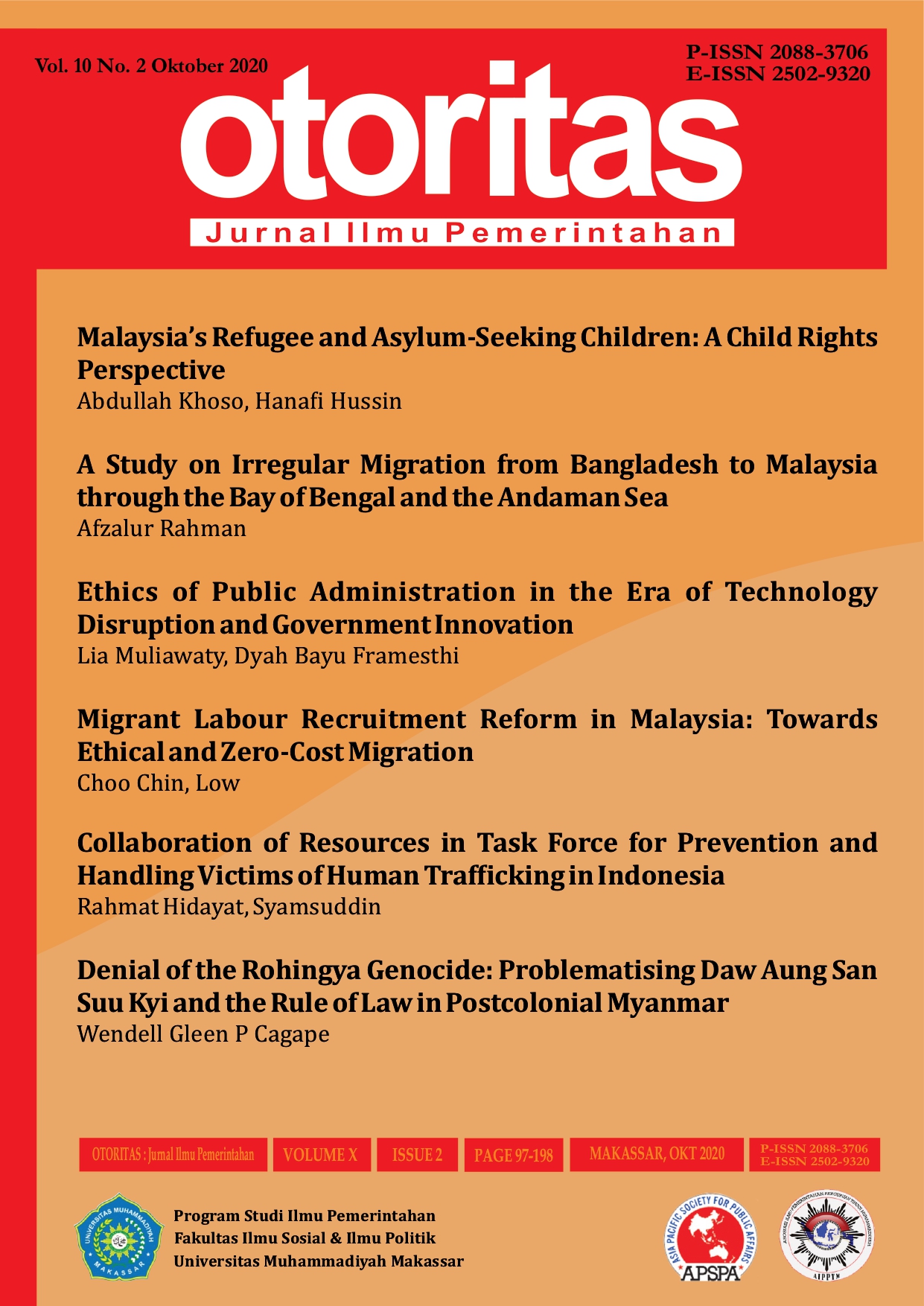Ethics of Public Administration in the Era of Technology Disruption and Government Innovation
DOI:
https://doi.org/10.26618/ojip.v10i2.3219Keywords:
Administration Ethics, Ethics, Government Innovation, Public Administration, Public Service, Technology DisruptionAbstract
Good public administration services are the main thing in running a quality government. Therefore, ethics is a major part of maintaining the quality of public administration services, especially in the era of Industry 4.0 which needs to also apply ethics in using technology. The purpose of this study is to examine the formation and implementation of ethics in public administration in the era of government innovation disruption due to technological development and disruption. This research uses a qualitative approach with descriptive analysis method which is sourced from various literature both primary and secondary, then an analysis of the various literature is carried out. Descriptive analysis results show that technology has become an indispensable need in government, in various fields and activities. Where, the disruption of the technology also impacts on various government innovations that really need ethics, especially on public services to avoid mal-administration. The impact of this research is knowledge of the importance of awareness of implementing ethics in public administration services in the era of technological disruption to improve the quality of government services.
References
Baktybayev, B. (2020). Analysis of the Relationship between Women’s Participation and the Rate of Corruption in the Post-Soviet States. Journal of Contemporary Governance and Public Policy, 1(1). https://doi.org/https://doi.org/10.46507/jcgpp.v1i1.3
Brands, R. F., & Kleinman, M. J. (2010). Robert’s Rules of Innovation: A 10-Step Program for Corporate Survival. New Jersey: John Wiley & Sons.
Buhalis, D., Harwood, T., Bogicevic, V., Viglia, G., Beldona, S., & Hofacker, C. (2019). Technological disruptions in services: lessons from tourism and hospitality. Journal of Service Management, 30(4), 484–506. https://doi.org/10.1108/JOSM-12-2018-0398
Dawes, S. S. (2009). Governance in the digital age: A research and action framework for an uncertain future. Government Information Quarterly, 26(2), 257–264. https://doi.org/10.1016/j.giq.2008.12.003
Denhardt, K. G. (1988). The ethics of public service: Resolving moral dilemmas in public organizations. Connecticut: Greenwood Publishing Group.
Denhardt, R. B., & Denhardt, J. V. (2000). The New Public Service: Serving Rather than Steering. Public Administration Review, 60(6), 549–559. https://doi.org/10.1111/0033-3352.00117
Dyussenov, M. (2019). The Role of ICT in Addressing Corruption Across Political Regimes. Otoritas : Jurnal Ilmu Pemerintahan, 9(1), 42–55. https://doi.org/10.26618/ojip.v9i1.1508
Handayaningrat, S. (1996). Pengantar Studi Ilmu Administrasi & Manajemen. Jakarta: Gunung Agung.
Holilah, H. (2013). Etika Administrasi Publik. Jurnal Review Politik, 3(2), 232–255.
Ibrahim, A. (2008). Pokok-Pokok Administrasi Publik & Implementasinya. Bandung: Refika Aditama.
Kilkki, K., Mäntylä, M., Karhu, K., Hämmäinen, H., & Ailisto, H. (2018). A disruption Framework. Technological Forecasting and Social Change, 129, 275–284. https://doi.org/10.1016/j.techfore.2017.09.034
Lewis, C. W., & Gilman, S. C. (2005). The ethics challenge in public service: A problem-solving guide. New Jersey: John Wiley & Sons.
Maani, K. D. (2010). Etika pelayanan publik. Jurnal Demokrasi, 9(1).
Nazir, M. (2003). Metode Penelitian. Jakarta: Ghalia Indonesia.
Offe, C. (2008). Contradictions of the Welfare State. Philadelphia: Routledge location.
Pasolong, H. (2008). Teori Administrasi Publik. Bandung: Alfabeta.
Plant, J. F. (2018). Responsibility in Public Administration Ethics. Public Integrity, 20(sup1). https://doi.org/10.1080/10999922.2017.1413927
Putra, R. M. D. (2018). Inovasi Pelayanan Publik Di Era Disrupsi (Studi Tentang Keberlanjutan Inovasi E-Health di Kota Surabaya). Kebijakan Dan Manajemen Publik, 6(2).
Rasyid, R. (1998). Desentralisasi dalam menunjang pembangunan daerah dalam pembangunan administrasi di Indonesia. Jakarta: Pustaka LP3ES.
Ristiandy, R. (2020). BUREAUCRATIC DISRUPSION AND THREATS OF UNEMPLOYMENT IN THE INDSUTRI 4.0 REVOLUTION. Journal of Local Government Issues, 3(1). https://doi.org/10.22219/logos.v3i1.10923
Santoso, T., & Dewi, M. P. (2019). Etika Aparatur Sipil Negara dalam Membangun Good Governance. Transparansi : Jurnal Ilmiah Ilmu Administrasi, 2(2), 179–187. https://doi.org/10.31334/transparansi.v2i2.648
Setiyono, B., & Atmojo, T. (2014). Pemerintahan & manajemen sektor publik: prinsip-prinsip manajemen pengelolaan negara terkini. Yogyakarta: CAPS (Center of Academic Publishing Service).
Songklin, P. (2017). Ethics in Public Administration: Theoretical Foundation. In Proceedings of the International Conference on Ethics in Governance (ICONEG 2016). Paris, France: Atlantis Press. https://doi.org/10.2991/iconeg-16.2017.87
Sugiyono, S. (2009). Metode Penelitian Kuantitatif, Kualitatif, dan R&D. Bandung: Alfabeta.
Suherry, S. (2017). Politik Pemberantasan Korupsi di Indonesia. Otoritas : Jurnal Ilmu Pemerintahan, 7(1), 46. https://doi.org/10.26618/ojip.v7i1.417
Supardal, S. (2016). Penerapan ICT dalam Pelayanan Publik di Kabupaten Bantul. Otoritas : Jurnal Ilmu Pemerintahan, 6(2), 120. https://doi.org/10.26618/ojip.v6i2.272
Whitney, F. (1960). The elements of research (Asian Edition). New Jersey: Prentice-Hall.
Downloads
Published
Issue
Section
License
The Editorial Team of Otoritas: Jurnal Ilmu Pemerintahan reserves the right to transfer the copyright of the article once it has been accepted and a decision has been made to publish it.
Department of Government Studies, Faculty of Social and Political Sciences, Universitas Muhammadiyah Makassar in collaboration with Muhammadiyah’s College Association of Government Studies (AIPPTM) and Asia Pacific Society for Public Affairs (APSPA) as the publisher of Otoritas: Jurnal Ilmu Pemerintahan holds the copyright of all articles published in this journal.
The Publisher holds the right to reproduce and distribute the article and author is not allowed to publish the same article published in this journal.
Statement of Authenticity and Manuscript Copyright can be downloaded: here
After filling in the statement letter, please send via e-mail: otoritas@unismuh.ac.id






